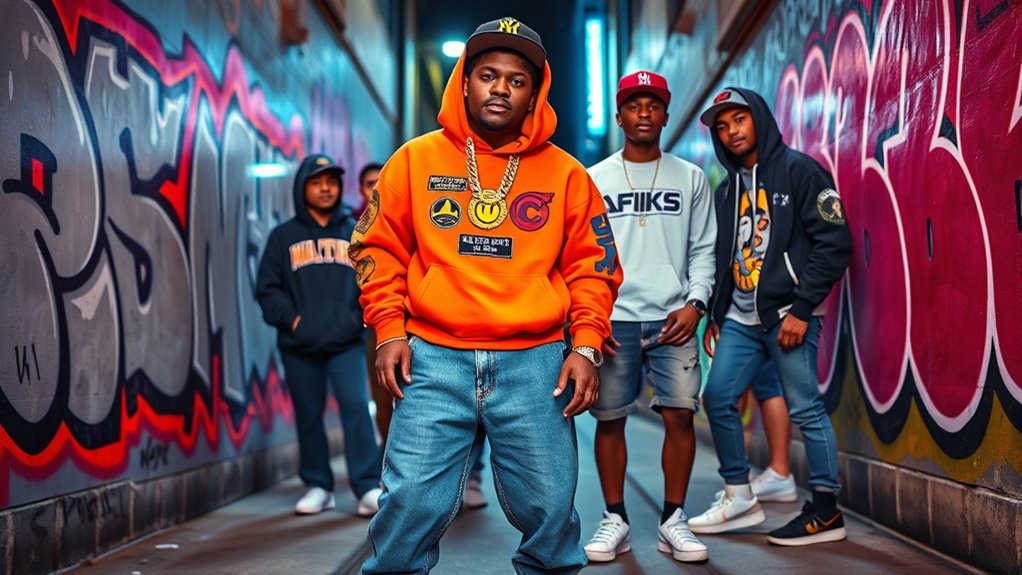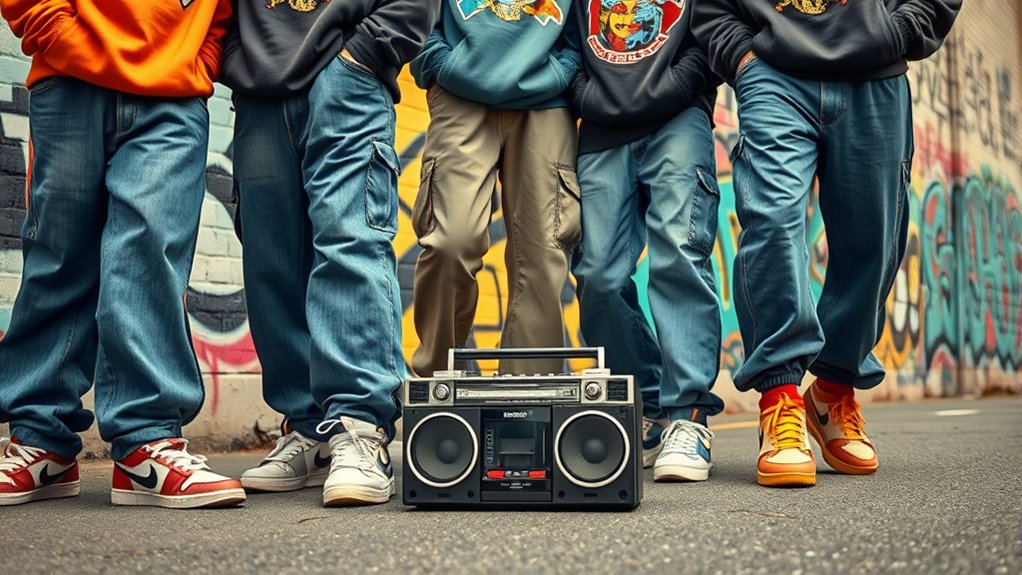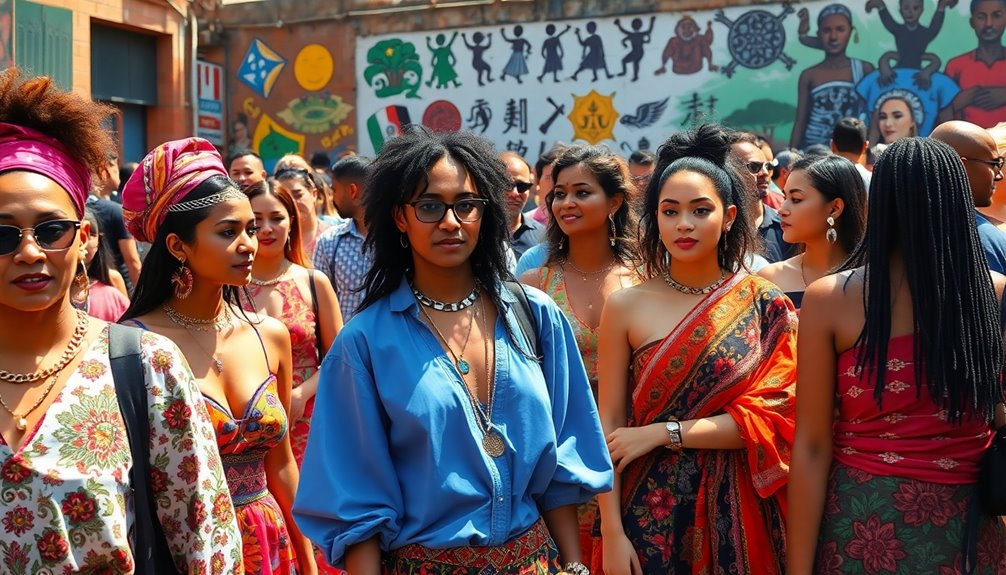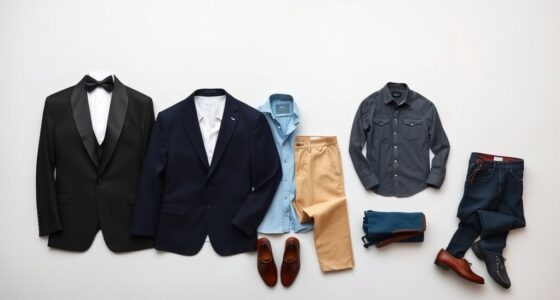Hip-hop transformed fashion by turning streetwear from underground roots into a worldwide movement. You see influences like baggy jeans, oversized hoodies, and sneakers that became symbols of identity and rebellion. Celebrity icons like Run-D.M.C., Tupac, and modern artists pushed these styles into mainstream culture, blending luxury with streetwear. Collaborations with high-end brands now make streetwear more accessible, showing how hip-hop has forever changed how we express ourselves through fashion. Keep exploring to discover how this movement continues to shape style today.
Key Takeaways
- Hip-hop originated as an underground movement emphasizing comfort, practicality, and identity, which influenced streetwear styles.
- Celebrities like Run-D.M.C. and Tupac popularized streetwear, challenging fashion norms and inspiring mainstream adoption.
- The transition of streetwear from grassroots to luxury brands blurred fashion lines and increased its global influence.
- Collaborations between hip-hop artists and high-end brands elevated streetwear’s status and made it more accessible.
- Hip-hop’s emphasis on authenticity and self-expression transformed fashion into a powerful cultural statement worldwide.

Have you ever wondered how hip-hop culture has shaped the way we think about fashion? It’s a story of evolution, rebellion, and influence that’s transformed mainstream style. The streetwear evolution, in particular, highlights how what started as an underground movement became a global phenomenon. Originally born out of urban neighborhoods, streetwear was about comfort, practicality, and asserting identity. Baggy jeans, oversized hoodies, and sneakers weren’t just clothing choices—they were statements of belonging and resistance. Over time, these elements gained popularity beyond the streets, blending into high fashion and luxury brands. This shift was fueled by a growing appreciation for authenticity and individuality, which hip-hop artists embraced and showcased in their music and style. As their influence expanded, streetwear moved from niche to mainstream, shaping the way people dress daily.
Celebrity influence played a pivotal role in accelerating this change. Hip-hop artists like Run-D.M.C., Tupac, and later Kanye West and Pharrell Williams became not just musical icons but fashion trailblazers. When Run-D.M.C. donned Adidas sneakers and tracksuits in the 1980s, it wasn’t just about comfort—it was a deliberate style statement that challenged conventional fashion norms. Their endorsement of brands and their distinct looks helped popularize streetwear as a credible and desirable style. As these celebrities gained fame, their fashion choices became influential, inspiring fans to emulate their looks. This created a ripple effect, pushing streetwear into the mainstream and making it desirable across different social classes.
The influence of celebrity culture didn’t stop with music. Today’s icons, from Travis Scott to Billie Eilish, continue to push boundaries, blending luxury with streetwear. They set trends that many try to follow, often collaborating with high-end brands to create limited-edition sneakers, hoodies, and accessories. These collaborations blur the lines between streetwear and luxury, making high fashion more accessible and rooted in hip-hop culture. Interestingly, the crossover between fashion and music has also led to increased demand for collaborations, further elevating streetwear’s status in the global fashion scene. Basically, celebrity influence has democratized fashion, encouraging self-expression and individuality.
In the end, hip-hop’s influence on fashion is undeniable. It’s a story of how grassroots movements and celebrity culture combined to redefine what’s fashionable. Today, streetwear isn’t just a style—it’s a way to express identity, rebellion, and creativity. Thanks to this cultural evolution, what you wear reflects a deeper story of authenticity and influence rooted in hip-hop’s vibrant legacy.
Frequently Asked Questions
How Did Hip-Hop Influence Streetwear Brands’ Popularity?
You see, hip-hop greatly boosted streetwear brands’ popularity by shaping streetwear branding and making it more influential. Artists in music videos adopted bold styles, emphasizing oversized clothes, sneakers, and logos, which fans enthusiastically copied. This fusion of music video styles and streetwear created a cultural movement, making these brands trendy and sought after. Your favorite artists became style icons, fueling demand and transforming streetwear into a global fashion phenomenon.
What Specific Accessories Did Hip-Hop Artists Popularize?
You’ll notice that hip-hop artists popularized accessories like graffiti-inspired jewelry and oversized sunglasses, making them iconic. These accessories became symbols of style and status, with graffiti jewelry reflecting urban art culture and oversized sunglasses adding a bold, confident look. By embracing these items, hip-hop artists influenced fans and fashion enthusiasts worldwide, transforming everyday accessories into essential elements of streetwear fashion that still resonate today.
How Has Hip-Hop Impacted High Fashion Collaborations?
Ever wonder how street style met high society? Hip-hop’s influence on collaborations with luxury branding has transformed fashion, making runway shows more inclusive and edgy. You see hip-hop’s bold, rebellious spirit reflected in designer lines, blending streetwear with high fashion. This fusion creates a new narrative, where luxury isn’t just for the elite but resonates with urban culture, redefining what’s stylish and elevating the entire fashion industry.
What Role Did Regional Hip-Hop Scenes Play in Fashion Trends?
You see, regional hip-hop scenes played a vital role in shaping fashion trends by showcasing local styles and inspiring wider audiences. Local artists often set trends that reflected their unique cultural identities, from the West Coast’s bold streetwear to the South’s flashy, embellished looks. These regional styles influenced mainstream fashion, encouraging diversity and creativity. As you follow these scenes, you notice how they continuously push the boundaries of fashion, making it more vibrant and inclusive.
How Has Hip-Hop’s Evolution Reflected in Sneaker Culture?
You see, hip-hop’s evolution is deeply reflected in sneaker culture through graffiti art and dance styles. As dance styles like breakdancing and street dance grew, sneakers became essential, symbolizing identity and style. Graffiti art inspired bold, vibrant sneaker designs, pushing boundaries. You notice collaborations between artists and brands, blending street art with footwear. This evolution shows how hip-hop’s creativity and self-expression continue shaping sneaker culture today.
Conclusion
You might think fashion and hip-hop are just trends, but they’ve actually reshaped how we express ourselves every day. By breaking traditional rules and embracing bold styles, hip-hop proves that fashion is a powerful form of identity. So, don’t dismiss it as just music—it’s a cultural movement that’s forever changed what we wear and how we see ourselves. Embrace the influence; after all, your style is your statement.






